Bansel Osteopathy is a leading osteopathic practice in Haywards Heath that offers cranial osteopathy in West Sussex to newborns, children, and adults. Using gentle, hands-on techniques to ease tension throughout the body, our experienced team delivers cranial osteopathy to clients of all ages in a calm and supportive environment. Cranial Osteopathy also uses gentle manipulation which could help soothe and relax your baby.
What is Cranial Osteopathy?
Cranial osteopathy, also known as craniosacral therapy or cranial therapy, is a very safe, effective, and gentle technique which involves the use of light pressure to enable the body to release tensions and strains. It was developed in the early 1900s, when Dr. William Garner Sutherland suggested the bones in the skull have slight, involuntary mobility, and the ‘cranial rhythm’, which is the subtle, rhythmical shape change of the skull, can be felt throughout the body’s tissues. It is thought that physical and emotional trauma can disrupt this rhythm, and that’s where osteopaths come in – to try and restore balance and improve overall health.
Key components of cranial osteopathy include:
- The craniosacral system – the cranium, spine, and sacrum.
- Cerebrospinal fluid – the fluid that surrounds the brain and spinal cord which has a rhythmic fluctuation that influences the nervous system.
- Fascia – the connective tissue that transmits mechanical tension throughout the body.
During the session, a practitioner will ‘listen’ to the body with their hands to identify areas of stress or strain and gently release tension using subtle manipulations of the cranial bones, spine, and surrounding tissue.
Cranial osteopathy is most commonly used in the treatment of babies and children, but is suitable for all ages and can be very useful where patients do not like manipulation or in conditions such as osteoporosis, where you do not want to exert a lot of force on someone’s body.
We are well known for cranial osteopathy right across Sussex and especially in Haywards Heath and the surrounding area. Our expert team has years of experience and is happy to discuss any specific issues or questions you may have. Our clinic is a happy and friendly place for adults and children alike. We also offer a wide range of appointment times to suit most needs.
If you are looking for cranial osteopathy in Sussex or would like a confidential chat to discuss whether cranial osteopathy would be an appropriate approach to your condition prior to booking an appointment, please do not hesitate to contact our Haywards Heath clinic.
Baby Cranial Osteopathy across Sussex
Because of the gentle nature of cranial osteopathy and craniosacral therapy, it is highly suitable for treating babies and children. It can be very useful in assisting babies to recover from the physical effects of birth. Bruising and head shape issues can often work themselves out, but cranial osteopathy can assist where this process is incomplete. It can also help with common concerns such as colic, reflux, feeding difficulties, unsettled sleep, and irritability. By relieving stress throughout the baby’s body, it may support more restful sleep, smoother feeding, less crying, and a greater sense of comfort, happiness, and overall well-being.
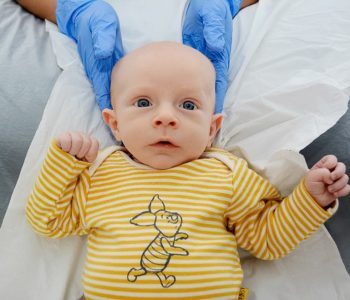

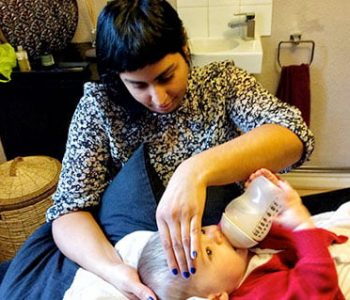

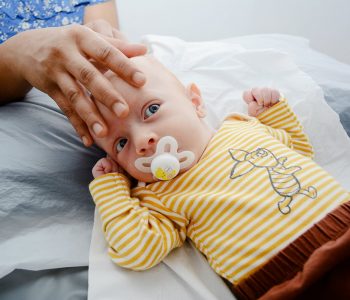

If you would like to discuss your own child, please get in touch today
Cranial Osteopathy for Adults in Sussex
While often associated with the treatment of babies, craniosacral therapy is also very effective for treating adults too. It can be particularly helpful in managing issues such as headaches, stress, temporomandibular joint (TMJ) dysfunction, and post-concussion syndrome.
As each treatment is specifically tailored to your individual needs, as with a structural osteopathic approach, we might also advise you on self-treatment techniques, corrective exercise prescription and pain management.
Cranial Osteopathy is also effective in toddlers and older children too.
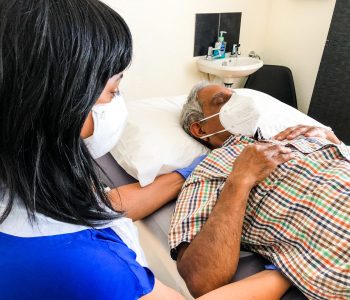

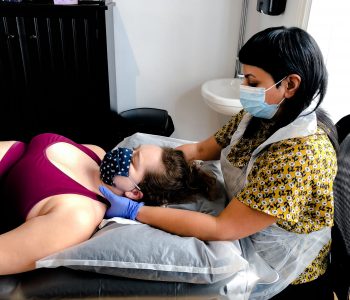

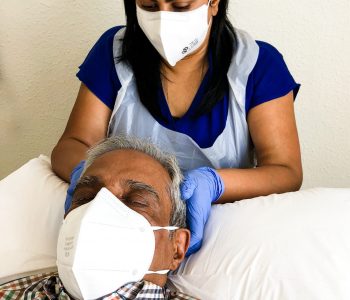

How Much Does Cranial Osteopathy Cost?
If you’re interested in our osteopathy treatment for either yourself or your child, please see the pricing information below:
- 1-hour initial consultation – £69.00
- 30-minute follow-up treatment – £59.00
- 45-minute follow-up treatment – £85.00
- 1 hour follow-up treatment – £99.00
- 4 hand cranial session with Jasi and Shani – £85.00
- 90-minute mum and baby session – £99.00
For more information on our pricing, please visit our fees page or contact us directly.
Four Hand Technique Treatment Sessions
These sessions are an ideal way to maximise the effects of your treatment and benefit from the combined skills of two practitioners. During this technique, two practitioners (four hands) will work in a coordinated manner to achieve a deeper state of relaxation. The technique aims to overwhelm the nervous system with synchronised, rhythmic touch so the brain has a harder time tracking sensations and, instead, just gives up trying to allow for a more profound release of tension.
This form of structured treatment has the same cranial outlook, but with two practitioners, we can look at the whole body at once, rather than one specific area like most other treatments. This treatment is therefore going to be more intense, but ultimately help you recover quickly.
Check out Hiisha’s video below for more information on the four-hand technique in cranial osteopathy and craniosacral therapy! Four-hand technique appointments with Jasi and Shani are available on Mondays and Thursdays. Contact the clinic for more details.
What to expect
During a cranial osteopathy treatment or baby cranial osteopathy, you will feel the the osteopath putting an extremely light pressure on different areas of your body. Some patients are aware of different sensations in their body while treatment is occurring, while others are unaware of anything happening at the time but say that they feel different afterwards. The majority of patients become very relaxed during treatment and it is not uncommon for patients to fall asleep. Sometimes babies do cry during parts of the treatment, this is usually helped by either feeding, sucking on a dummy or being distracted by playing with their toys or watching/listening to something on their parent’s phone.
Cranial Osteopathy Testimonials
Madeleine Lipp
May
Sophie
Allison
Steph
Nicki
Donna
Kiera
Alex
Difference Between Cranial Osteopathy and Craniosacral Therapy
Both cranial osteopathy and craniosacral therapy are gentle, hands-on therapies; however, there are significant differences in training standards, scope of practice, and theoretical focus.
Cranial Osteopathy
- Requires full osteopathic training followed by postgraduate specialisation.
- Practitioners are able to diagnose conditions and integrate cranial work with other osteopathic techniques.
- Focuses on using inherent, rhythmic motions of the body, including the bones of the skull and spine.
- Uses slightly more pressure than craniosacral therapy whilst working with bones and deeper membranes.
Craniosacral Therapy
- Training standards are less stringent, and typically involve a comprehensive training programme at a recognised school, but a full degree is not required.
- Practitioners cannot provide the same level of medical diagnosis as a registered osteopath.
- Primarily focuses on the craniosacral system (the membranes and cerebrospinal fluid surrounding the brain and spinal cord).
- Uses light touch to gently support the body and release restrictions.
While their methods differ, both approaches aim to restore balance within the body, reduce pain and tension, and support overall well-being. At Bansel Osteopathy, our fully registered osteopaths combine cranial techniques with broader osteopathic care to address specific conditions and promote long-term health.
Cranial Osteopathy FAQs
Cranial osteopaths use a highly developed sense of touch to find areas within the body that are holding tension or strain, and to examine tissue quality throughout the body, including the head.
Cranial osteopathy works by using gentle touch to release tension from problem areas within the body, especially the skull. The restored function resulting from cranial osteopathy treatment can help with a wide range of conditions.
Absolutely. A cranial osteopath can assess your baby for any misalignments and for any tensions or strains that their head or bodies are holding. As a result, the skull is easily traumatised, especially in ventouse or forceps deliveries, breech births, caesareans and for big babies or fast deliveries. All of these scenarios can lead to health problems later on. Cranial osteopathy helps to counteract such issues and promotes maximum health.
On the first visit, we will take a detailed medical history of your child. We will ask questions about the birth and any presenting complaints. We will then carry out a medical examination to assess the nature of the symptoms and then carry out treatment according to our findings. We will always explain everything we do as we go along.
Cranial osteopathy is a very gentle and safe form of treatment and is suitable for babies, children and the elderly, as well as all ages in between.
Cranial osteopathy treatments are very gentle and generally very relaxing for babies and children. Some babies can become a little unsettled after treatment but in most cases, parents notice their child is calmer and more relaxed following treatment.
This is generally due to the changes happening in their bodies. In these instances, most parents report that their child was just a bit irritable for a few days. In most cases, parents notice their child is calmer and more relaxed following treatment.
In most cases treatment will be carried out during the first visit, following a full examination. If there is any reason we cannot treat your child, we will provide an explanation and refer you to your GP or an appropriate medical practitioner.
You do not need a GP referral to see a private cranial osteopath.
Every case is different. Usually babies respond quickly and benefit significantly from 2 to 6 treatments. We will have a better idea of the number of treatments required after the initial examination.
There is a small chance your child may be slightly unsettled for up to 48 hours following treatment, but in most cases, parents only notice a positive difference. There are little or no side effects from cranial osteopathic treatment.
Many health insurance policies include cranial osteopathy in treatments covered by their policy. Every insurance policy is different, so always check with your insurer prior to making an appointment for advice on what your individual policy covers.
Get in touch
For more information on any of our services or to request an appointment with our team, get in touch today on 01444 441 160 or use the contact form below and a member of the team will get back to you shortly.
